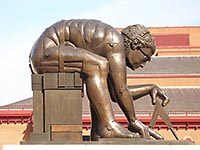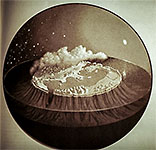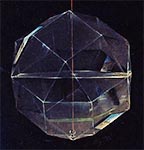God the GEOMETER
003 geometer -'GOD -the Geometer'
God as Architect/ Builder/ Geometer/ Craftsman, The Frontispiece of Bible MoraliséeDescription: Science, and particularly geometry and astronomy / astrology, was linked directly to the divine for most medieval scholars. The compass in this 13th century manuscript is a symbol of God´s act of Creation. God has created the universe after geometric and harmonic principles, to seek these principles was therefore to seek and worship God.
Circa 1220-1230, illumination on parchment, 34.4 x 26 cm (13.5 x 10.2 in)
Current location: Austrian National Library
Accession number: Codex Vindobonensis 2554, f.1 verso
Source/Photographer: archiv.onb.ac.at
©: anonymous artist, Public Domain Wikipedia
see also this: commons.m.wikimedia.org/wiki/Book_of_Genesis_2
tags: #God, Geometer
003a geometer -Eduardo Paolozzi

Statue of Newton (after Paolozzi) in the British Library courtyard (London)
©: phot.: David Olivier, Wikimedia CC
tags: #Paolozzi, geometer
link: www.i-can-see.academy
004b fractals -Leonardo de Vinci's 'Flower of Life'
 A picture of one of Leonardo da Vinci's drawings of the ornamental structure named today 'Flower of Life'.
A picture of one of Leonardo da Vinci's drawings of the ornamental structure named today 'Flower of Life'.Date between 1478 and 1519, source: Codex Atlanticus, fol. 307v
©: PD = Public Domain; more examples
tags: #Leonardo da Vinci, flower of life, fractals
005 flat earth -Homer's view of the earth (900 B.C.)
 Rendition of Homer's view of the world (prior to 900 BC). The Homeric conception of the world involved a flat, circular Earth, surrounded by mountains and by Oceanus, the world-ocean of classical antiquity, considered to be an enormous river encircling the world. The Sun emerges from underneath the Earth, traveling along the fixed dome of the sky, and is shown rising from Oceanus.
Rendition of Homer's view of the world (prior to 900 BC). The Homeric conception of the world involved a flat, circular Earth, surrounded by mountains and by Oceanus, the world-ocean of classical antiquity, considered to be an enormous river encircling the world. The Sun emerges from underneath the Earth, traveling along the fixed dome of the sky, and is shown rising from Oceanus.©: en.wikipedia.org/wiki/Alexander_the_Great_in_the_Quran
tags: #Homer, flat earth
005a flat earth -Portrait of Luca Pacioli (detail)
 The small picture, the rhombicuboctahedron , is a just a detail, click on it to see the full painting.
The small picture, the rhombicuboctahedron , is a just a detail, click on it to see the full painting.This is where it all comes together:
- Religion: Luca Pacioli (1445 - 1514), a Franciscan friar,
- Science: 'to study science is to worship God' architecturalintentions2012.wordpress.com
- Flat / Round Earth: compare with 005 and 005c
- Art: Luca Pacioli was a close friend of another genius Leonardo da Vinci, some sources name the second person in the picture as Albrecht Dürer.
Links:
History of Mathematics, Portrait of Luca Pacioli, www.ritrattopacioli.it, www.georgehart.com, www.cs.berkeley.edu
©: 'Portrait of Luca Pacioli', a painting traditionally attributed to Jacopo de' BARBARI (1495), (Museo di Capodimonte).
tags: #Luca Pacioli, Museo di Capodimonte, Leonardo da Vinci
ref. # 159a (reverse #002) -God Started Creation on Waters
The Ancestors of the Israelites had close contact with Babylonia. Abraham actually came from there and his later generations moved into Egypt. It's natural that they would have described the universe similarly except that God created it all. In the book of Genesis of the Christian Bible, it was written: "In the beginning God created the heaven and the earth. [Chapter 1:Verse 1.] And the earth was without form, and void. And darkness was upon the face of the deep. And the Spirit of god moved upon the face of the waters. [Chapter 1: Verse2]"It is obvious that water existed before the creation, and that God's work on earth started from the waters.
source: ABCC Australia 2015 www.new-physics.com
tags: #god,#bible, #ocean
"I believe this is a reference to the following quote by Galileo GALILEI (1564 - 1642): "Mathematics is the language with which God wrote the universe.". link: www.cs.cornell.edu/
If a physicist or mathematician talks about god with reference to physics or maths, they tend to use the term as a shorthand for "nature", or "the laws of the universe". Thus when Einstein says "God does not play dice with the universe", it's a figure of speech: he's really talking about the laws of nature, not a religious entity as such.
This type of God is often referred to as "the God of Spinoza", a 17th century Dutch philosopher, who put forward the idea that God is the universe and its laws, rather than an anthropomorphic entity existing outside the universe. Spinoza's "God" can be interchanged with such terms as "the cosmos" or "nature", both of which are defined (as far as we can tell) in mathematical terms.
Einstein himself agreed: “I believe in Spinoza's God, who reveals Himself in the lawful harmony of the world, not in a God who concerns Himself with the fate and the doings of mankind...
Therefore, the quote from Galileo, which your question echoes, can be interpreted as support for "the god of Spinoza", (even though Spinoza came after Galileo) and since this is a commonly used term within scientific/philosopical discussion about God, you could just stick with that rather than invent something new.
http://plato.stanford.edu/entries/spinoza/"
taken from: https://english.stackexchange.com/questions
If a physicist or mathematician talks about god with reference to physics or maths, they tend to use the term as a shorthand for "nature", or "the laws of the universe". Thus when Einstein says "God does not play dice with the universe", it's a figure of speech: he's really talking about the laws of nature, not a religious entity as such.
This type of God is often referred to as "the God of Spinoza", a 17th century Dutch philosopher, who put forward the idea that God is the universe and its laws, rather than an anthropomorphic entity existing outside the universe. Spinoza's "God" can be interchanged with such terms as "the cosmos" or "nature", both of which are defined (as far as we can tell) in mathematical terms.
Einstein himself agreed: “I believe in Spinoza's God, who reveals Himself in the lawful harmony of the world, not in a God who concerns Himself with the fate and the doings of mankind...
Therefore, the quote from Galileo, which your question echoes, can be interpreted as support for "the god of Spinoza", (even though Spinoza came after Galileo) and since this is a commonly used term within scientific/philosopical discussion about God, you could just stick with that rather than invent something new.
http://plato.stanford.edu/entries/spinoza/"
taken from: https://english.stackexchange.com/questions
Relationship between religion and science. (2022, December 21). In Wikipedia. https://en.wikipedia.org/wiki/Relationship_between_religion_and_science


